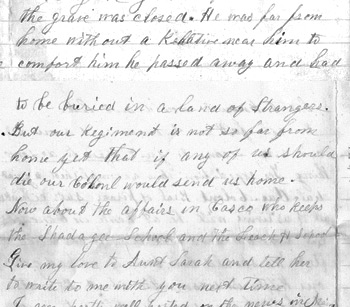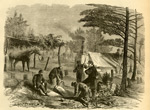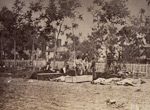Click Center Image for Full Size Picture
Very soon after mustering into the Army, Abial Edwards had his first experience with the death and burial of a fellow soldier. He describes the solemn occasion in one of his first letters, written to his sister Marcia on November 16 while on guard duty at the Baltimore and Ohio Railroad:
November 16, 1861, Camp Beals, Maryland.
"Oh Anna," he wrote, "if you could only see this valley here and there it is dotted with nameless graves some there as that [they] died fighting for their Country lying quietly by the side of those that had raised their hand against it."
In his letter dated July 4, 1862, Edwards told Anna about the loss of the company's orderly, Sergeant Frank H. Pratt. As the company sat down to rest under a tree, Pratt was accidently shot in the head by one of the soldiers in the company. Edwards was deeply saddened by this loss and mentioned it again to Anna in a letter dated the next day. In the wake of Pratt's death, Edwards reflected on a verse sent to him by his sister Marcia: "Two lines that I have thought a great deal of since his death it was this. (Do you ever feel as you draw a breath), (That the next may be the gasp of death?) Never did a few words seem so true to me as that did to see Frank sitting beside us in perfect health and the next second a lifeless corps not a single breath after the ball struck him passed his lips."
As the war continued and Edwards became a seasoned veteran, his dialogue moved from his mortality to his deepening feelings of pride, patriotism, and duty. He told Anna as he and his company prepared to fight General Robert E. Lee's forces at Antietam, "I hope we are ready to meet them and if it should be my lot to fall in the defense of my beloved Country I hope to be ready. For it seems as though I never could return home unless we conquer."



